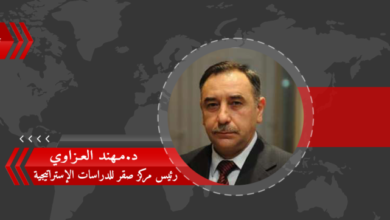
بعد 100 يوم هل تغير إسرائيل أهدافها في الحرب؟
أصبحت في حاجة إلى حل ولو موقتاً لحين التوصل إلى خيار سياسي أو أمني تحسباً لسيناريوهات تطاول المصالح الغربية والأميركية
بعد مرور 100 يوم من الحرب على قطاع غزة سيظل السؤال المطروح: ماذا عن الخيارات والبدائل التي تملكها إسرائيل للتعامل مع القطاع بعيداً من المزايدات الإعلامية والشو السياسي والإعلامي الذي تجاوزته أطراف المواجهة المباشرة، سواء كانت السلطة الفلسطينية – حماس أو إسرائيل، وغير المباشرة، التي تتمثل في الولايات المتحدة وإيران والأطراف الوكيلة التي تعمل في المشهد، سواء كانت الفصائل الفلسطينية في لبنان والعراق وفي سوريا، إضافة إلى قوات “حزب الله” والميليشيات الحوثية.
ولعل هذا يؤكد أننا الآن في مرحلة انتقالية وصعبة، وترتبط بالفعل بالترتيبات الأمنية والاستراتيجية الجاري التخطيط والتنفيذ لها في الفترة الراهنة، وتجاوز ما هو قائم من خيارات، بمعنى الانتقال من الأقوال والتصريحات إلى الأفعال.
مخطط لافت
تخطط الحكومة الإسرائيلية في الوقت الراهن للانتقال إلى مرحلة أخرى من المواجهات في قطاع غزة، وهو ما يشير إلى أن المرحلة الحالية سترتبط بعدة خطوات.
الأولى العمل في عمق القطاع مباشرة من خلال خط تواصل استراتيجي ممتد يستهدف تقليص مساحة القطاع من الشمال، ومن مناطق التماس سواء من الشمال إلى شرق ووسط إلى الجنوب، وإن كانت هناك تباينات عديدة حول مساحة هذه المنطقة المحددة، التي قد توفر الأمن الاستراتيجي المنشود لإسرائيل في الأقل في المدى المتوسط، بخاصة أن إسرائيل لا تريد أن يتكرر مشهد السابع من أكتوبر (تشرين الأول) مرة أخرى، سواء من القطاع أو من الشمال، مع توجيه رسائل تطمينات إلى المستوطنين الذين هددوا بإحداث قلاقل في الساحة السياسية، ودفع الحكومة إلى تبني إجراءات وتدابير مختلفة، وإلا فإن الأمر سيكون كارثة على إسرائيل.
الثانية، الانتقال إلى تبني إجراءات تنفيذية في الداخل، من خلال الاستمرار في تبني مقاربة للاعتماد على القبائل والعشائر الفلسطينية المتعاملة. ومن ثم، فإن الحديث عن دخول عناصر من السلطة الفلسطينية أو قوة فلسطينية تتبعها ما زال مستبعداً، وهو ما سيعني في محصلته عدم القبول بحلول وقتية، مثلما طالب وزير الخارجية بلينكن أخيراً.
وفي ظل خيارات صعبة وغير مؤثرة تؤكد أن السلطة الفلسطينية لا تحظى فقط وإلى الآن إلا بدعم دولي وعربي لافت، وإن كانت إسرائيل لا تزال ترى أن السلطة أضعف من إدارة الأوضاع في القطاع، وفي ظل حالة عدم الاستقرار التي تعم القطاع، بل والضفة الغربية أيضاً، وعدم وجود فرص حقيقية للاستقرار السياسي، أو الاستراتيجي، مما قد يضع الجميع في مساحة من عدم الاتفاق.
الثالثة، ثبت جلياً أن القدرات الإسرائيلية العسكرية الكبيرة قد أدت بالفعل إلى تقليص المقاومة الفلسطينية بصورة كبيرة، وهدم القطاع وضرب بنيته الاقتصادية بصورة كاملة مما سيعوق الحياة فيه، ومن ثم فإن الحديث عن عودة سكان الشمال كلام مرسل، ولا معنى له، وأنه غير منطقي رغم ما تطرحه الولايات المتحدة من خيارات موقتة، وغير دائمة، وفي ظل تحفظات أميركية بالغة بأن الاستمرار في خط المواجهات مع المقاومة لن يكون مجدياً، بل وسيكون مكلفاً لإسرائيل بالفعل، وأن عليها مراجعة مجمل السياسات الراهنة بأكملها.
تدابير عاجلة
يجري الحديث الإسرائيلي هنا عن إجراءات عامة وعمليات نوعية، وتخفيض مستوى الاستهداف للعناصر الفلسطينية، بخاصة في المستوى الميداني، والاكتفاء باستهداف العناصر التابعة لقوات “حزب الله”.
هذا الأمر يفسر أسباب توقف إسرائيل عن استهداف قيادات ميدانية أخرى من المقاومة الفلسطينية، بعد تصفية القيادي صالح العاروري، والاكتفاء باغتيال قيادات من “حزب الله”، بخاصة أن المستوى السياسي حذر بالفعل من الذهاب إلى استراتيجية الحسم أو الخيار شمشون، مما قد يؤدي إلى جر إسرائيل وحلفائها إلى مساحات أخرى من المواجهات. وهو ما يفسر توسيع نطاق العمليات التي تقوم بها ميليشيات الحوثي من جانب، والفصائل العراقية والسورية، واشتعال جبهة “حزب الله” تدريجاً، مما قد يؤدي إلى مواجهات إقليمية دولية، بعد أن بدأت الولايات المتحدة وبريطانيا في توجيه ضربات في اليمن، مما يؤكد أن استراتيجية الولايات المتحدة دفع إسرائيل إلى التهدئة، والشروع قدماً في تبني إجراءات عاجلة في عمق القطاع، وحسم مستوى النار، وهو مما يؤكد أن إسرائيل في طريقها إلى تخفيض مستوى المواجهات تحسباً لسيناريوهات تطول المصالح الغربية عامة والأميركية، بخاصة مما تتطلب مراجعات وسياسات جديدة خلال المدى القصير.
الاتجاهات المطروحة
في ظل ما يجري، فإن الحكومة الإسرائيلية ستعتمد عدة خيارات محددة ومنضبطة، أهمها التسريع بمستوى الإنجاز الاستراتيجي من يناير (كانون الثاني) إلى مارس (آذار)، وخلال الأشهر الثلاثة الأولى ستتجه إلى اعتماد استراتيجية الجزم أولاً بالذهاب إلى حل سياسي وأمني، تشارك فيه الدول المعنية، على رأسها مصر. وقوات متعددة الجنسيات والولايات المتحدة وربما ألمانيا والنرويج كأطراف وسيطة مع تأجيل التعامل مع ما تبقى من المقاومة الفلسطينية، على اعتبار أن هذا الأمر مسؤولية دولية، ومن خلال دور عربي وفلسطيني بالأساس.
وهذا يشير إلى أن التعامل مع قطاع غزة حتى مع وجود حركة “حماس” سيظل وارداً ومطروحاً، ويمكن البناء عليه، وأن الأمر سيتم من خلال عناصر تنتمي إلى حركة “حماس”، ولديها القدرات في التعامل، وهو ما يعيد التذكرة أن إسرائيل ذاتها، ومن خلال إجراءاتها وخطواتها التي سمحت بها لتسهيل حركة “حماس” عند نشأتها الأولى كانت إسرائيل من منحت ومن قدمت ومن سهلت.
هذا السيناريو وارد التكرار في الفترة المقبلة، مما يؤكد أن إسرائيل ستمارس ضغطها على الولايات المتحدة ومصر بالأساس للتعجيل بتبني الحل المرحلي، والعاجل الذي يمكن أن يكون له الأولوية بصرف النظر عن التعامل مع الملفات الجزئية، والإفراج عن الأسرى العسكريين، وإنهاء حكم حركة “حماس” على الأرض، والسماح للسلطة الفلسطينية بالمشاركة السياسية والإدارية فيما سيجري.
وهو ما سيكون له الأولوية في الطرح ما بين الأطراف المباشرة، بخاصة أن إسرائيل طلبت من أطراف عربية محددة، ومن خلال دولة خليجية تمارس الحياد الإيجابي البناء بالضغط على إيران، لوقف ما يجري في القطاع، مقابل السماح بالتوصل إلى صفقة مرحلية.
ومع دخول ألمانيا والنرويج على الخط قد يكون هناك انفراج حقيقي في الموقف الخاص بالإفراج عن بعض الأسرى، بخاصة أن إسرائيل تتخوف من رد الفعل من قبل الميليشيات الوكيلة، بخاصة مع “حزب الله” الذي بدأ في اتباع تكتيك جديد، مما قد يكلف إسرائيل كثيراً من التداعيات التي قد لا تتحملها كدولة وحكومة في ظل تصميم الحكومة الإسرائيلية على إدارة المشهد من عدة جوانب وحسم الأمر بعد فترة من التجاذبات التي يبديها المستوى السياسي في إسرائيل، التي دفعت الولايات المتحدة بالفعل إلى التوقف بالمطالبة بتغيير مكونات الائتلاف الحاكم في إسرائيل، بل ودعم الموقف الراهن للحكومة، وتخفيف مستوى الانتقاد لما يجري، وهو ما سيقوي المستوى السياسي الإسرائيلي، بخاصة مع حاجتها إلى دعم ومساندة، بعد تداول محكمة العدل الدولية للدعوى المرفوعة من قبل جنوب أفريقيا، واستمرار انتقاد إسرائيل في المستوى الدولي، وهو ما تتخوف من تبعاته الحكومة الإسرائيلية.
كما تخشي من رد الفعل الراهن على أي سلوك إسرائيلي بما في ذلك نزع شرعية إسرائيل كدولة وليس حكومة قد تمضي اليوم أو غداً أمام المحافل الدولية، وهو ما يشير إلى أن إسرائيل وبعد مرور 100 يوم من العمليات على قطاع غزة عليها أن تراجع حضورها الأمني والسياسي، وأن تبحث عن حل، ولو موقتاً لحين التوصل إلى خيار سياسي أو أمني، وهو ما تدرك تبعاته إسرائيل في المستويين القصير ومتوسط الأجل.
ضوابط مطلوبة
في ظل انفتاح المشهد السياسي والاستراتيجي الراهن، وعدم وجود عوامل أو محفزات للتحرك، فإن فرص التسوية للأزمة تأخذ أكثر من منحى حقيقي للتعامل، وعلى رأس ذلك العمل على خيارات عامة، والانتقال من الرفض الكامل للمقترحات التي يعمل عليها الوسطاء، بخاصة مصر وقطر، فإن التحرك الإسرائيلي سيركز على أن ما تحتاج إليه إسرائيل في الوقت الراهن الحفاظ على أمنها، وعدم الدخول في مواجهات مع “حزب الله” وتأمين حضورها الإقليمي، وأن لا تدخل في مواجهات مفتوحة في ظل الخسائر التي تجري في الداخل، التي تحتاج إسرائيل إلى إيقاف نزف ما يجري.
ولهذا، فإن إسرائيل لن تقبل بوقف إطلاق النار إلا في حال التجاوب مع ما تطرحه من ضوابط أو معطيات من الجانب الأميركي والأوروبي، بل والأممي للقبول بحسم الأمر، وإنهاء الصراع الراهن والانتقال إلى مرحلة أخرى من الترتيبات الأمنية، التي ستقررها بنفسها وتعمل عليها إسرائيل من خلال مقاربة ضيقة تركز على الأمن أولاً على أي خيار آخر، بما في ذلك التحسب لأية أحداث طارئة، ومنها التخوف من اندلاع انتفاضة كبيرة داخل الضفة الغربية، مما قد يؤدي إلى مزيد من التوتر.
وفي ظل التوقع بأن أية ترتيبات أمنية داخل القطاع ستحتاج إلى مزيد من الوقت، والتوقع بحدوث كثير من المناكفات التي ستطرحها حركة “حماس”، بخاصة أن إسرائيل تتوقع أن المستوى العسكري في حركة “حماس” وقياداتها الميدانية لن تسلم بسهولة، ولن تقبل بالخروج من المشهد، بل ستكون على خط المواجهة، وإن تحولت إلى جيوب قد تهدد الاستقرار الراهن، بل وقد تؤدي إلى إفشال أية توافقات في حال العمل على خيار الحسم، وعدم تبني خيار توافقي قد يكون مقبولاً لبعض الوقت، لكن لن يكون هو الحل الحقيقي والمباشر، مما سيطرح وبعد مرور 100 يوم من الحرب على قطاع غزة، أي مسار ستمضي فيه المواجهات، وعلى أي مستوى يمكن التوقع بالسيناريو الواقعي الذي ستقبل فيه إسرائيل بالحل.
الخلاصات الأخيرة
في كل الأحوال لا بد لإسرائيل أن تقدم بعض التنازلات، وتقديم رواية وموقف مخالف لما أعلنته قبل الـ100 يوم من الحرب على قطاع غزة، بخاصة بعد أن تيقنت أنه من الصعب العمل على الأهداف نفسها التي فشلت في تحقيقها عسكرياً أو استراتيجياً.
من ثم، فإن الحل هو الاتجاه إلى القبول بالواقع الراهن، والعمل في إطار ترتيبات محددة قد لا تلقى قبولاً في الأقل حالياً من جانب المستوى السياسي، وبعض القطاعات الأمنية داخل الدولة، بل وخارجها أيضاً.
الاندبندنت
بعد 100 يوم هل تغير إسرائيل أهدافها في الحرب؟ | اندبندنت عربية (independentarabia.com)
لا يتبنى المركز ماورد بالمقال ويمثل وجهة نظر الكاتب.
14-1-2024





